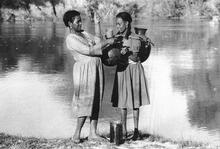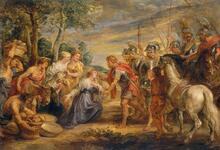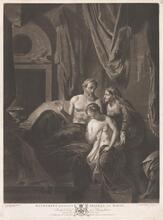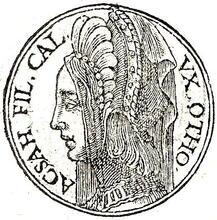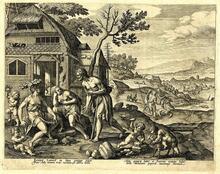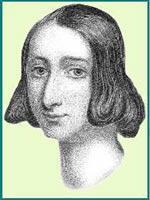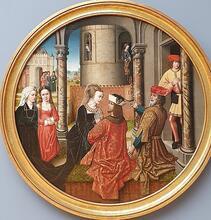Queen of Sheba: Midrash and Aggadah
The Queen of Sheba questioned the wisdom of King Solomon and traveled to see whether he could live up to his reputation. The midrash relates how she created several scenarios to test King Solomon and was impressed by his responses. She also posed four riddles to him, all relating to gender and family. The Queen was so overwhelmed by King Solomon and God’s miracles that she converted to Judaism after visiting Solomon.
Narrative of the Queen’s Visit to Solomon
In the midrashic account, the Queen of Sheba heard of King Solomon’s great wisdom and declared: “I will go and see whether he is wise or not, and I will come to test him with riddles.” She came to Solomon and asked him: “Are you the Solomon about whom, about whose kingdom and about whose wisdom I have heard?” He replied that he was. She then said to him: “You are truly wise, now I will ask you something, and we shall see if you are capable of answering me,” to which he responded: “For the Lord grants wisdom; knowledge and discernment are by His decree” (Prov. 2:6). The Queen of Sheba asked: “What are the seven that issue and nine that enter, the two that offer drink, and the one that drinks?” Solomon answered: “The seven that issue are the seven days of menstrual impurity. The nine that enter are the nine months of pregnancy. The two that offer drink are the breasts, and the child is the one who drinks” (Midrash Proverbs [Buber ed.] 1).
The Queen of Sheba exclaimed: “You are truly wise, I will put another question to you, and we shall see if you can answer me.” He responded: “For the Lord grants wisdom.” She asked him: “How can a woman say to her son: ‘Your father is my father; your grandfather, my husband; you are my son, and I am your sister?’” Solomon replied: “The two daughters of Lot” (who became pregnant by their father and bore sons).
When the Queen of Sheba saw that he solved her riddles, she brought before him children who were of the same height and who were in like attire. She asked him: “Distinguish between the males and the females.” He made a sign to his eunuchs, who brought him nuts and roasted ears of corn, which they scattered before the children. The males, who were not bashful, collected them and tied them within the hems of their garments. The girls, however, were bashful (since their bodies would be revealed if they were to tie their undergarments) and therefore tied them within their outer garments. Solomon told the queen: “These are the males, and these are the females.” She told him: “You are exceedingly wise” (Midrash Proverbs [Buber ed.] 1).
The Queen of Sheba brought a number of people before Solomon, some circumcised and others uncircumcised. She asked of him: “Distinguish between the circumcised and the uncircumcised.” Solomon immediately made a sign to the High Priest to open the Ark of the Covenant. Those who were circumcised stood or bowed their bodies to half their height, while their countenances were filled with the radiance of the Shekhinah. The uncircumcised, however, fell on their faces.
Solomon immediately told the Queen of Sheba: “These are the uncircumcised, and these are the circumcised.” She asked him: “How did you know?” He explained to her: “From Balaam the uncircumcised, of whom it is said: ‘who beholds visions from the Almighty, prostrate, but with eyes unveiled’ [Num. 24:4]. If he did not prostrate himself, he would see nothing. I also learned from Job, for when the three friends of Job came to console him, he told them [Job 12:3]: ‘I am not less than you’ [literally, I do not fall from you]—I do not fall like you, for you are uncircumcised, while I am circumcised” (Midrash Proverbs [Buber ed.] 1).
The queen said to Solomon: “But I did not believe the reports [of your wisdom] until I came and saw with my own eyes that not even the half had been told me; your wisdom and wealth surpass the reports that I heard. How fortunate are your men and how fortunate are these your courtiers, who are always in attendance on you and can hear your wisdom! Praised be the Lord your God, who delighted in you and set you on the throne of Israel. It is because of the Lord’s everlasting love for Israel that He made you king to administer justice and righteousness [I Kings 10:7–9]” (Midrash Proverbs [Buber ed.] 1). According to another tradition, the Queen of Sheba’s praise was mainly for the righteousness that she saw in Solomon’s kingdom, which is why she ended with the words “that He made you king to administer justice and righteousness” (Shir ha-Shirim Zuta [Buber ed.] 1:15).
The Riddles and Gender
The riddles that the Queen of Sheba put to Solomon attest to familiarity with the stories of the Torah she-bi-khetav: Lit. "the written Torah." The Bible; the Pentateuch; Tanakh (the Pentateuch, Prophets and Hagiographia)Torah, and especially with those about Gentiles (the daughters of Lot, Balaam, and Job). The queen’s interest in Jewish culture is consistent with the tradition that her encounter with Solomon led to her conversion to Judaism (see below). The main shared element of all her riddles is that they are concerned with gender: the first focuses on women, the two middle riddles relate to males and females, and the fourth, to men.
The first riddle pertains to the female’s birth cycle: menstruation, pregnancy, birth, and nursing. The riddle is elusive, since its verbs are couched in the masculine: “yozim [issue] … nikhnasim [enter] … mozgim [offer drink],” and Solomon’s wisdom is patent in his discovery of the solution in feminine matters. The second riddle is about the family unit. It threatens the generational hierarchy within the family, by interchanging father and grandfather, husband and father, mother and sister. The solution restores the normal order, since it reveals that this is an exceptional case, which held good only for the daughters of Lot.
The third riddle indicates the differences between males and females that are already noticeable in young children, and is connected to the shame felt by girls at publicly exposing parts of their bodies; Solomon’s wisdom is evident in his knowledge of human nature. The last riddle regards male sexuality and distinguishes between someone who underwent circumcision and one who remained uncircumcised. Solomon shows that this physical difference has spiritual consequences, since these two groups exhibit disparate religious behavior. King Solomon’s ability to answer the queen’s four questions is indicative of his wisdom, since he is as cognizant of female nature as of the male character.
Queen of Sheba’s Conversion
The midrash relates that after hearing all of Solomon’s wisdom and the miracles that God had performed in his time, she proclaimed: “Praised be the Lord your God,” and with this declaration she expressed her desire to join the people of Israel. The Rabbis compare the Queen of Sheba with Jethro and with Rahab, two important Gentiles who sought to adhere to Israel. The queen’s visit to King Solomon is a fulfillment of Jer. 16:19: “To You nations shall come from the ends of the earth and say: Our fathers inherited utter delusions, things that are futile and worthless.” The queen came from the ends of the earth and, as a result of her stay with Solomon, came to believe in the Lord (Ex. Rabbah 27:4). This midrash of the queen’s conversion may have led to the development of a literary tradition that appears in a later midrash, according to which Solomon married the Queen of Sheba and she bore him a son named Ben Sira (Alphabet of Ben Sira, in Ozar ha-Midrashim [Eisenstein], p. 35, para. 1).
Yet another midrashic tradition maintains that no woman ever reigned over Sheba, that “whoever says that there was a woman who was Queen of Sheba [Malkat Sheva] is in error,” and that these Hebrew words really mean the kingdom of Sheba (Malkhut Sheva), which is why these verses are in the feminine, reflecting the gender of the word malkhut, rather than referring to an actual woman. The kingdom of Sheba sent high-ranking ministers to Solomon, and the words of admiration for Solomon are attributed to the entire kingdom, not just to its leader (BT Bava Batra 15b).
Additional riddles posed by the Queen of Sheba to King Solomon are to be found in the Targum literature, in Targum Sheni to Esth. 1:3; and in the late midrash: Midrash Hefez, published by S. Schechter, Folk-Lore 1 (1890), pp. 349–358. These legends, in compact form, were also collected by Louis Ginzberg, The Legends of the Jews (Philadelphia, 1947), vol. 4, pp. 142–149.


